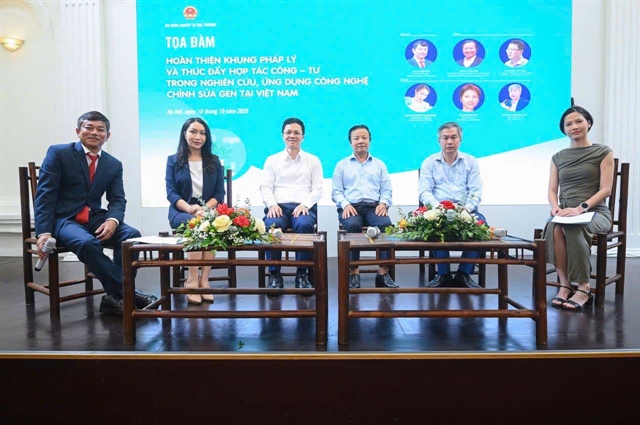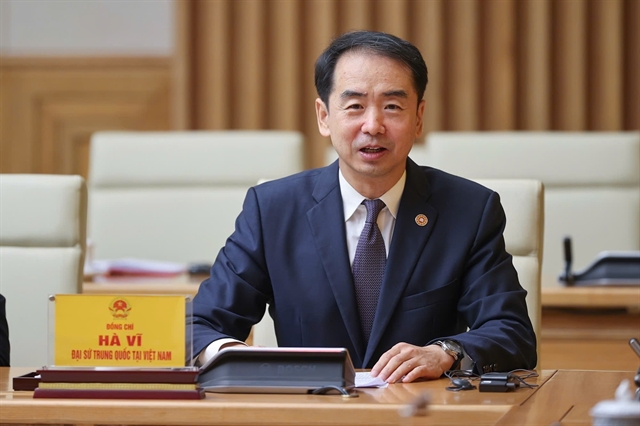 Society
Society


|
| Experts attend the forum. — VNS Photo Tố Như |
HÀ NỘI — Biotechnology is considered a strategic sector, helping Vietnamese agricultural products gain economic advantages, improving exploitation efficiency and enhancing international competitiveness.
Deputy Minister of Agriculture and Environment Phùng Đức Tiến emphasised the forum "Gene editing in agriculture – A strategic technology associated with the legal framework” organised on Sunday in Hà Nội.
The forum was held under direction of the Ministry of Agriculture and Environment, aiming to seek sustainable and practical solutions for gene technology development.
In his opening speech, Deputy Minister Tiến said that biotechnology is not a new issue but has long been identified as a strategic breakthrough direction.
This field includes many important areas such as gene manipulation, tissue and embryo culture, and beneficial organisms development.
Gene technology has brought many outstanding results, contributing to agriculture promotion towards organic, circular and innovative development, in line with the Science, Technology, and Innovation Development Strategy until 2030.
Thanks to gene technology applications, Việt Nam has created many high-yield, high-quality plant and livestock breeds.
In agriculture, 85 per cent of new rice varieties and 89 per cent of high-quality rice have been applied, contributing to a rice output of 34.8 million tonnes in the first nine months of this year, ensuring domestic food security and affirming Việt Nam’s position in the international food market.
Currently, science and technology contribute about 30 per cent of the total added value of the agricultural sector. Thanks to technical advancements, Vietnamese agriculture not only secures national food security but also stabilises global supply.
This year, the agricultural sector could achieve a record export value of approximately US$67–70 billion — proof of the effectiveness of scientific and technological innovation.
Deputy Minister Tiến said that in the context of a world population of eight billion and the challenge of ensuring three meals a day, Việt Nam’s role in the global food supply chain became even more critical.
Many countries, such as Singapore, Indonesia, the Philippines, Malaysia and Brazil, have import demands; for instance, the Philippines imports over one million tonnes of rice annually, presenting both an opportunity and a responsibility for Việt Nam to affirm its position in the international market.
Completing legal frameworks
Deputy Minister Tiến noted that science and technology drive sustainable agricultural development, improve productivity, quality and global competitiveness.
Resolution No 19 on agricultural, farmer and rural development and Resolution No 57 of the Politburo issued on July 10 last year emphasise that science, technology and innovation are key drivers to modernise production forces and increase the economy’s added value.
The implementation of policies such as Decision No 429/QĐ-TTg on developing the agricultural biotechnology industry until 2030 confirms that biotechnology is no longer just a research field but an area with systematic investment and practical production application.
According to the Deputy Minister, strategic technologies, especially biotechnology, play a key role. Whoever masters the technology will have an advantage in an economy based on high-quality labor and efficient raw material exploitation.
To promote gene-editing technology, Việt Nam needs to review and perfect its legal environment to facilitate businesses and scientists.
With the rapid development of technology worldwide, lagging behind would cause Việt Nam to fall behind.
Combining policies, investment and legal frameworks is necessary to enhance Việt Nam’s international competitiveness in agricultural products and biotechnology.
Gene-editing technology allows precise intervention in plant genomes to create salt-tolerant, disease-resistant, nutrient-rich varieties or extend shelf life. Consequently, the breeding period shortens from 10–15 years to 2–5 years.
Inspiring creativity
Domestic institutes and universities like the Agricultural Genetics Institute, Việt Nam National University of Agriculture, Việt Nam National University – Hà Nội and the HCM City Biotechnology Centre have mastered this technology with notable achievements such as salt-tolerant and disease-resistant rice, soybeans with reduced indigestible sugars, carotenoid-rich tomatoes, and higher-yield, quality maize and papaya.
Experts assert that if Việt Nam completes the legal framework, develops supportive policies and applies product-based management mechanisms, gene-editing technology will help ensure food security, adapt to climate change, reduce emissions and enhance the competitiveness of Vietnamese agricultural products.
At the forum, Nguyễn Văn Long, director of the Science and Technology Department, said the global trend in gene-edited crop management is shifting toward encouraging innovation while ensuring safety and transparency in agricultural trade.
Many countries, especially in Asia, are improving legal frameworks to leverage new technologies’ benefits, enhance competitiveness and address climate change.
Countries adopt an open view, considering gene-editing technology a crucial tool for sustainable agriculture.
Product evaluation currently focuses on the final plant traits rather than the production process, especially for products without foreign DNA.
In Việt Nam, the Party and State have issued several directives to promote research, application, and safe management of genetically modified organisms (GMOs).
The 2008 Biodiversity Law defines GMOs and provides a basic legal framework for GMO management. However, the gene-editing technology legal system remains incomplete.
Additionally, scientific communication is limited, causing public caution about genetically modified and edited products, while research-business-production linkage is still ineffective.
To resolve this, Việt Nam is considering amending the 2008 Biodiversity Law to update regulations on gene editing and build suitable management and trade mechanisms aligned with global trends. This requires coordination among ministries, scientists, businesses and strong commitment from policymakers.
Gene-editing technology allows precise intervention in plant genomes to create salt-tolerant, disease-resistant, nutrient-rich varieties or extend shelf life without introducing foreign genes as in GMO.
Thus, the breeding time is shortened from 10–15 years to 2–5 years. However, according to the 2008 Biodiversity Law, gene-edited products are still classified with GMOs, causing difficulties in commercialisation and international integration.
According to Nguyễn Duy Phương, head of Molecular Pathology Division under the Agricultural Genetics Institute, Việt Nam should manage gene-edited crops by evaluating the final product rather than overemphasising the method of creation.
Also, some concepts in the Biodiversity Law need adjustment, such as clearly defining GMOs as organisms whose genetic structure is changed by gene transfer technology.
Phương said the world is advancing rapidly in this field from research, application, patent registration to regulation and commercialisation. Việt Nam has sufficient conditions not to be left behind, but to achieve this, the public, managers, and policymakers must correctly understand the nature of gene-editing technology, avoid confusion with GMOs, and adopt flexible, practical approaches suited to the country's agricultural development. — VNS




